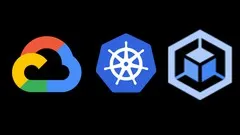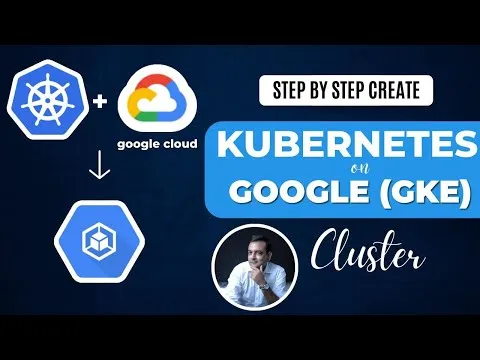
Google Kubernetes Engine GKE with DevOps 75 Real-World Demos 
Discover the power of Google Kubernetes Engine (GKE) with DevOps in this comprehensive course featuring 75 real-world demos. From creating a Google Cloud account to mastering Kubernetes concepts and Google Cloud Platform services, this course covers it all. Learn how to deploy, update, and rollback Kubernetes deployments, configure storage and networking, implement load balancing and SSL certificates, and much more. With step-by-step instructions and friendly support, you'll gain hands-on experience and real implementation skills. Enroll now and take advantage of the 30-day money-back guarantee. ▼
ADVERTISEMENT
Course Feature
![]() Cost:
Cost:
Paid
![]() Provider:
Provider:
Udemy
![]() Certificate:
Certificate:
Paid Certification
![]() Language:
Language:
English
![]() Start Date:
Start Date:
2023-04-05
Course Overview
❗The content presented here is sourced directly from Udemy platform. For comprehensive course details, including enrollment information, simply click on the 'Go to class' link on our website.
Updated in [September 19th, 2023]
What does this course tell?
(Please note that the following overview content is from the original platform)
******* Course Overview *******Welcome to this Amazing course on Google Kubernetes Engine GKE with DevOps 75 Real-World Demos Below is the list of modules covered in this course Course Modules01 Google Cloud Account Creation02 Create GKE Standard Public Cluster 03 Install gcloud CLI on mac OS 04 Install gcloud CLI on Windows OS 05 Docker Fundamentals 06 Kubernetes Pods 07 Kubernetes ReplicaSets 08 Kubernetes Deployment - CREATE 09 Kubernetes Deployment - UPDATE 10 Kubernetes Deployment - ROLLBACK 11 Kubernetes Deployments - Pause and Resume 12 Kubernetes ClusterIP and Load Balancer Service 13 YAML Basics 14 Kubernetes Pod & Service using YAML 15 Kubernetes ReplicaSets using YAML 16 Kubernetes Deployment using YAML 17 Kubernetes Services using YAML 18 GKE Kubernetes NodePort Service 19 GKE Kubernetes Headless Service 20 GKE Private Cluster 21 How to use GCP Persistent Disks in GKE ? 22 How to use Balanced Persistent Disk in GKE ? 23 How to use Custom Storage Class in GKE for Persistent Disks ? 24 How to use Pre-existing Persistent Disks in GKE ? 25 How to use Regional Persistent Disks in GKE ? 26 How to perform Persistent Disk Volume Snapshots and Volume Restore ? 28 GKE Workloads and Cloud SQL with Public IP 29 GKE Workloads and Cloud SQL with Private IP 30 GKE Workloads and Cloud SQL with Private IP and No ExternalName Service 31 How to use Google Cloud File Store in GKE ? 32 How to use Custom Storage Class for File Store in GKE ? 33 How to perform File Store Instance Volume Snapshots and Volume Restore ? 34 Ingress Service Basics 35 Ingress Context Path based Routing 36 Ingress Custom Health Checks using Readiness Probes 37 Register a Google Cloud Domain for some advanced Ingress Service Demos 38 Ingress with Static External IP and Cloud DNS 39 Google Managed SSL Certificates for Ingress 40 Ingress HTTP to HTTPS Redirect 41 GKE Workload Identity 42 External DNS Controller Install 43 External DNS - Ingress Service 44 External DNS - Kubernetes Service 45 Ingress Name based Virtual Host Routing 46 Ingress SSL Policy 47 Ingress with Identity-Aware Proxy 48 Ingress with Self Signed SSL Certificates 49 Ingress with Pre-shared SSL Certificates 50 Ingress with Cloud CDN HTTP Access Logging and Timeouts 51 Ingress with Client IP Affinity 52 Ingress with Cookie Affinity 53 Ingress with Custom Health Checks using BackendConfig CRD 54 Ingress Internal Load Balancer 55 Ingress with Google Cloud Armor 56 Google Artifact Registry 57 GKE Continuous Integration 58 GKE Continuous Delivery 59 Kubernetes Liveness Probes 60 Kubernetes Startup Probes 61 Kubernetes Readiness Probe 62 Kubernetes Requests and Limits 63 GKE Cluster Autoscaling 64 Kubernetes Namespaces 65 Kubernetes Namespaces Resource Quota 66 Kubernetes Namespaces Limit Range 67 Kubernetes Horizontal Pod Autoscaler 68 GKE Autopilot Cluster 69 How to manage Multiple Cluster access in kubeconfig ? Kubernetes Concepts Covered in the course01 Kubernetes Deployments (Create Update Rollback Pause Resume)02 Kubernetes Pods03 Kubernetes Service of Type LoadBalancer04 Kubernetes Service of Type ClusterIP05 Kubernetes Ingress Service06 Kubernetes Storage Class07 Kubernetes Storage Persistent Volume08 Kubernetes Storage Persistent Volume Claim09 Kubernetes Cluster Autoscaler10 Kubernetes Horizontal Pod Autoscaler11 Kubernetes Namespaces12 Kubernetes Namespaces Resource Quota13 Kubernetes Namespaces Limit Range14 Kubernetes Service Accounts15 Kubernetes ConfigMaps16 Kubernetes Requests and Limits17 Kubernetes Worker Nodes18 Kubernetes Service of Type NodePort19 Kubernetes Service of Type Headless20 Kubernetes ReplicaSetsGoogle Cloud Platform Services Covered in the course01 Google GKE Standard Cluster02 Google GKE Autopilot Cluster03 Compute Engine - Virtual Machines04 Compute Engine - Storage Disks05 Compute Engine - Storage Snapshots06 Compute Engine - Storage Images07 Compute Engine - Instance Groups08 Compute Engine - Health Checks09 Compute Engine - Network Endpoint Groups10 VPC Networks - VPC11 VPC Network - External and Internal IP Addresses12 VPC Network - Firewall13 Network Services - Load Balancing14 Network Services - Cloud DNS15 Network Services - Cloud CDN16 Network Services - Cloud NAT17 Network Services - Cloud Domains18 Network Services - Private Service Connection19 Network Security - Cloud Armor20 Network Security - SSL Policies21 IAM & Admin - IAM22 IAM & Admin - Service Accounts23 IAM & Admin - Roles24 IAM & Admin - Identity-Aware Proxy25 DevOps - Cloud Source Repositories26 DevOps - Cloud Build27 DevOps - Cloud Storage28 SQL - Cloud SQL29 Storage - Filestore30 Google Artifact Registry31 Operations Logging32 GCP MonitoringEach of my courses comes withAmazing Hands-on Step By Step Learning ExperiencesReal Implementation ExperienceFriendly Support in the Q&A section"30-Day "No Questions Asked" Money Back Guaranteed by Udemy"We consider the value of this course from multiple aspects, and finally summarize it for you from three aspects: personal skills, career development, and further study:
(Kindly be aware that our content is optimized by AI tools while also undergoing moderation carefully from our editorial staff.)
What skills and knowledge will you acquire during this course?
During this course, the learner will acquire a wide range of skills and knowledge related to Google Kubernetes Engine (GKE) and DevOps. The course covers various modules, including creating a Google Cloud account, installing the gcloud CLI on different operating systems, understanding Docker fundamentals, working with Kubernetes pods, replica sets, and deployments.
The learner will also gain knowledge about YAML basics and how to use it for creating Kubernetes resources such as pods, services, replica sets, and deployments. They will learn about different types of Kubernetes services, including ClusterIP, Load Balancer, NodePort, and Headless services.
The course also covers topics related to persistent storage in GKE, such as using GCP Persistent Disks, Balanced Persistent Disks, Custom Storage Classes, Pre-existing Persistent Disks, and Regional Persistent Disks. The learner will also learn how to perform volume snapshots and volume restore operations.
Other topics covered in the course include working with GKE workloads and Cloud SQL, using Google Cloud File Store, configuring Ingress services for routing and load balancing, managing DNS with Cloud DNS, implementing SSL certificates, and performing HTTP to HTTPS redirects.
The course also covers advanced topics such as GKE workload identity, external DNS controller installation, using Google Cloud Armor for security, and integrating with Google Artifact Registry.
Additionally, the learner will gain knowledge about continuous integration and delivery in GKE, implementing Kubernetes probes for monitoring application health, managing cluster autoscaling, working with Kubernetes namespaces, and setting resource quotas and limit ranges.
Throughout the course, the learner will also gain hands-on experience with various Google Cloud Platform services, including Compute Engine, VPC Networks, Network Services, Network Security, IAM & Admin, DevOps tools like Cloud Source Repositories, Cloud Build, and Cloud Storage, SQL, Storage, Operations Logging, and GCP Monitoring.
Overall, this course provides a comprehensive learning experience with real-world demos, allowing the learner to acquire the necessary skills and knowledge to work with Google Kubernetes Engine (GKE) and DevOps effectively.
How does this course contribute to professional growth?
This course on Google Kubernetes Engine (GKE) with DevOps 75 Real-World Demos contributes significantly to professional growth. By completing this course, individuals can enhance their skills and knowledge in various areas related to GKE and DevOps practices.
Firstly, this course covers the creation of a Google Cloud Account and the installation of the gcloud CLI on both macOS and Windows OS. These fundamental skills are essential for professionals working with GKE and DevOps, as they provide the necessary foundation for managing and deploying applications on the Google Cloud Platform.
The course also delves into Docker fundamentals, Kubernetes Pods, ReplicaSets, and Deployments. These topics are crucial for professionals involved in containerization and orchestration using Kubernetes. By gaining expertise in these areas, individuals can effectively manage and scale containerized applications, improving their efficiency and productivity.
Furthermore, the course explores advanced concepts such as YAML basics, using YAML for deploying Pods, ReplicaSets, and Deployments, and working with various types of Kubernetes Services. These skills are valuable for professionals seeking to automate and streamline their application deployment processes, enabling them to efficiently manage complex infrastructures.
Additionally, the course covers topics like GKE Private Cluster, using Persistent Disks in GKE, integrating GKE with Cloud SQL and Google Cloud File Store, and implementing Ingress Services with advanced features like SSL certificates, load balancing, and routing. These topics provide professionals with the knowledge and skills to build scalable and secure applications on GKE, ensuring high availability and performance.
Moreover, the course touches upon important DevOps practices such as continuous integration and delivery, Kubernetes probes for monitoring application health, autoscaling, and managing multiple cluster access. These skills are essential for professionals working in DevOps roles, as they enable them to automate and optimize the software development and deployment lifecycle.
Overall, this course on Google Kubernetes Engine (GKE) with DevOps 75 Real-World Demos offers a comprehensive learning experience that equips professionals with the necessary skills and knowledge to excel in their careers. By mastering the concepts and techniques covered in this course, individuals can enhance their professional growth, improve their job prospects, and contribute effectively to their organizations' success.
Is this course suitable for preparing further education?
This course on Google Kubernetes Engine (GKE) with DevOps seems suitable for preparing for further education. The course covers a wide range of modules and concepts related to GKE, Kubernetes, and various Google Cloud Platform services. It provides hands-on learning experiences and real-world demos, which can help individuals gain practical knowledge and skills in using GKE for DevOps purposes. Additionally, the course offers friendly support in the Q&A section and a 30-day money-back guarantee, which indicates that the instructor is committed to providing a valuable learning experience. Overall, this course can be a valuable resource for individuals looking to enhance their knowledge and skills in GKE and DevOps, which can be beneficial for further education and career advancement.
Course Syllabus
Introduction
Section-02: Create GKE Standard Public Cluster
Section-03: Install gcloud CLI on mac OS
Section-04: Install gcloud CLI on Windows OS
Section-06: Kubernetes Pods
Section-07: Kubernetes ReplicaSets
Section-08: Kubernetes Deployment - CREATE
Section-09: Kubernetes Deployment - UPDATE
Section-10: Kubernetes Deployment - ROLLBACK
Section-11: Kubernetes Deployments - Pause and Resume
Section-12: Kubernetes ClusterIP and Load Balancer Service
Section-13: YAML Basics
Section-14: Kubernetes Pod & Service using YAML
Section-15: Kubernetes ReplicaSets using YAML
Section-16: Kubernetes Deployment using YAML
Section-17: Kubernetes Services using YAML
Section-18: GKE Kubernetes NodePort Service
Section-19: GKE Kubernetes Headless Service
Section-20: GKE Private Cluster
Section-21: How to use GCP Persistent Disks in GKE ?
Section-22: How to use Balanced Persistent Disk in GKE ?
Section-23: How to use Custom Storage Class in GKE for Persistent Disks ?
Section-24: How to use Pre-existing Persistent Disks in GKE ?
Section-25: How to use Regional Persistent Disks in GKE ?
Section-26: How to perform Persistent Disk Volume Snapshots and Volume Restore
Section-28: GKE Workloads and Cloud SQL with Public IP
Section-29: GKE Workloads and Cloud SQL with Private IP
Section-30: GKE Workloads and Cloud SQL with Private IP and No ExternalName Serv
Section-31: How to use Google Cloud File Store in GKE ?
Section-32: How to use Custom Storage Class for File Store in GKE ?
Section-33: How to perform File Store Instance Volume Snapshots and Volume Resto
Section-34: Ingress Service Basics
Section-35: Ingress Context Path based Routing
Section-36: Ingress Custom Health Checks using Readiness Probes
Section-37: Register a Google Cloud Domain for some advanced Ingress Service Dem
Section-38: Ingress with Static External IP and Cloud DNS
Section-39: Google Managed SSL Certificates for Ingress
Section-40: Ingress HTTP to HTTPS Redirect
Section-41: GKE Workload Identity
Section-42: External DNS Controller Install
Section-43: External DNS - Ingress Service
Section-44: External DNS - Kubernetes Service
Section-45: Ingress Name based Virtual Host Routing
Section-46: Ingress SSL Policy
Section-47: Ingress with Identity-Aware Proxy
Section-48: Ingress with Self Signed SSL Certificates
Section-49: Ingress with Pre-shared SSL Certificates
Section-50: Ingress with Cloud CDN, HTTP Access Logging and Timeouts
Section-51: Ingress with Client IP Affinity
Section-52: Ingress with Cookie Affinity
Section-53: Ingress with Custom Health Checks using BackendConfig CRD
Section-54: Ingress Internal Load Balancer
Section-55: Ingress with Google Cloud Armor
Section-56: Google Artifact Registry
Section-57: GKE Continuous Integration
Section-58: GKE Continuous Delivery
Section-59: Kubernetes Liveness Probes
Section-60: Kubernetes Startup Probes
Section-61: Kubernetes Readiness Probe
Section-62: Kubernetes Requests and Limits
Section-63: GKE Cluster Autoscaling
Section-64: Kubernetes Namespaces
Section-65: Kubernetes Namespaces Resource Quota
Section-66: Kubernetes Namespaces Limit Range
Section-67: Kubernetes Horizontal Pod Autoscaler
Section-68: GKE Autopilot Cluster
Section-69: How to manage Multiple Cluster access in kubeconfig ?
Section-05: Docker Fundamentals
Congratulations !!!
Course Provider

Provider Udemy's Stats at AZClass
Discussion and Reviews
0.0 (Based on 0 reviews)
Explore Similar Online Courses

Bootstrap 4 From Scratch With 5 Projects

Google Kubernetes Engine (GKE) - A Beginners Guide

Python for Informatics: Exploring Information

Social Network Analysis

Introduction to Systematic Review and Meta-Analysis

The Analytics Edge

DCO042 - Python For Informatics

Causal Diagrams: Draw Your Assumptions Before Your Conclusions

Whole genome sequencing of bacterial genomes - tools and applications

Create Kubernetes in GKE Step by Step Google Kubernetes Engine GCP Training 2023 K21Academy

Why you should create a GKE Autopilot cluster


Start your review of Google Kubernetes Engine GKE with DevOps 75 Real-World Demos